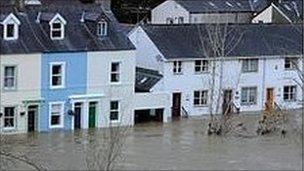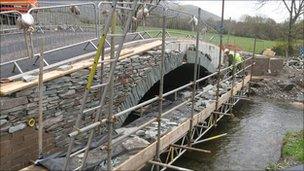Cumbria floods resulted in £276m bill
- Published

The council said damage put at £91m was caused to homes
Damage to homes, businesses and infrastructure caused by the Cumbrian floods in 2009 resulted in a £276m bill, it has emerged on the first anniversary of the disaster.
In November 2009 unprecedented rainfall caused rivers to burst their banks, flooding towns and villages.
A year on, Cumbria County Council said about 150 flooded households had still not returned to their properties.
A further 198 people in the affected areas had sought psychological help.
The council said the first road bridge to be completely rebuilt since the floods would reopen later to mark "a significant symbol of the recovery operation".
Little Braithwaite bridge, situated south of Braithwaite near Keswick, was completely destroyed by the floods.
Cumbria County Council said damage estimated at £124m was caused to shops, farms and factories during last year's floods.
It said damage put at a further £91m was caused to homes and £34m to the county's bridges and roads.

Little Braithwaite bridge was completely destroyed by the floods
Much of the cash has been borne by the insurance industry and the taxpayer through support and grants from local and central government.
There were 25,000 flood and storm damage insurance claims, according to the Association of British Insurers, with £174m paid out.
Twenty road bridges across Cumbria were destroyed or damaged but 17 of those are now open to traffic again.
The Grade II-listed Calva bridge in Workington is now expected to open early in the new year, meaning the town will once again have two working road bridges, including the temporary road bridge opened in April.
The town's Northside bridge which collapsed, killing police officer Pc Bill Barker, is expected to be replaced by 2012.
'Bounced back'
United Utilities dealt with damaged water mains and has built a new £3.4m wastewater pumping station at Willowholme in Carlisle.
More than 2,500 tonnes of gravel and debris, strewn across farmland downstream, has still to be dealt with.
Tourism suffered a "devastating" £15m hit with £2.5m lost on cancelled bookings alone and bookings down 7%, year on year.
But tourism has "bounced back" the council claimed, with visitor numbers stabilising. The council said it was "cautiously optimistic" for 2011.
- Published19 November 2010
- Published19 November 2010
- Published19 November 2010